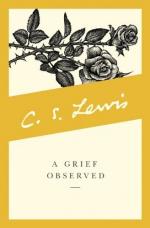
|
| Name: _________________________ | Period: ___________________ |
This test consists of 15 multiple choice questions and 5 short answer questions.
Multiple Choice Questions
1. When was another time when the author enjoyed rambling walks?
(a) When he was a bachelor.
(b) After the author's parents died.
(c) When his children were younger.
(d) When he was a child.
2. What did the Incarnation achieve, according to the author?
(a) It saved humanity.
(b) It ruined all previous ideas of the Messiah.
(c) It raised Lazarus from the dead.
(d) It created a religion.
3. What does the author think it means if human suffering is unnecessary?
(a) Either there is no God or He is bad.
(b) That humans bring on their own suffering.
(c) That human suffering is an illusion.
(d) That Satan causes suffering.
4. What effect did the author's experience of H. have on him?
(a) It restored his faith in God.
(b) It left him wanting H. even more.
(c) It assured him that she continued.
(d) It was like a spring cleaning of the mind.
5. Why could the author's records not achieve his intended purpose?
(a) Because the author stopped recording his thoughts.
(b) Because sorrow is a process, not a state.
(c) Because the author cannot understand his own thoughts.
(d) Because sorrow never ends.
6. About what/whom have the author's notes been throughout the book?
(a) The author's children and God.
(b) Only about the author.
(c) Only about H.
(d) God, the author, and H.
7. What one thing has sufficient force to rattle one's faith, according to the author in Chapter Three?
(a) Suffering.
(b) Losing faith in God.
(c) Explosive anger.
(d) One's own illness.
8. Against what were the author's records written?
(a) Total collapse.
(b) Insanity.
(c) Loss of the author's career.
(d) Losing memory of H.
9. What can the author's grief and memories never achieve?
(a) Giving the author comfort.
(b) Easing or aggravating H.'s past anguish.
(c) Bringing H. back.
(d) Restoring the author's faith in God.
10. What does the author ask if he is doing with his fallen house of cards?
(a) Rebuilding it.
(b) Burning the ruins.
(c) Seeking counseling to accept it.
(d) Leaving the devastation as it is.
11. In Chapter Four, what does the author suddenly feel walking through nature?
(a) Deep loss.
(b) Invitation to pre-H. happiness.
(c) Surrender to fate.
(d) Faith in God.
12. In Chapter Three, to what does the author compare grief?
(a) A lost friendship.
(b) A bomber circling round and round.
(c) A veterinarian.
(d) A game of Bridge.
13. What does the author think is the worst thing he could wish for H.?
(a) For her to come back.
(b) For her to remain gone.
(c) For her to have lived longer.
(d) For her to be with God.
14. What metaphor does the author use to describe grief in the beginning of the fourth chapter?
(a) A broken trolley.
(b) A long, winding valley.
(c) A hopeless child.
(d) A house of cards.
15. Why does the author walk all he can?
(a) To work off his frustration.
(b) So he can go to bed tired.
(c) To avoid his feelings.
(d) For his physical health.
Short Answer Questions
1. What does the author think might have influenced his faith in God?
2. What is the author's idea about reunion with the dead?
3. What does the author decide in Chapter Three is more important that being treated gently by God?
4. What motivated the author's attempt to hit back at God?
5. What does the author say can shatter the author's idea of God?
|
This section contains 579 words (approx. 2 pages at 300 words per page) |

|




